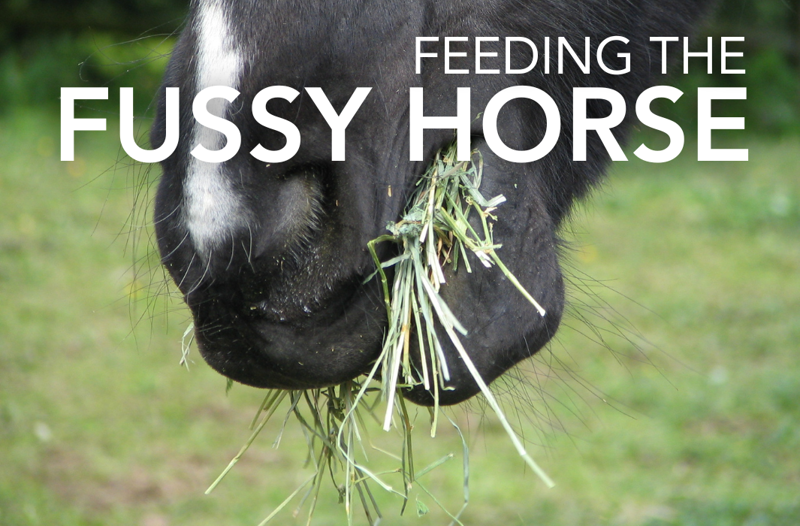Feeding a fussy horse can be extremely frustrating. Much as humans have varied and specific tastes, so do horses. While some may have very distinct tastes and refuse to eat all but a small range of feeds, others may only become suspicious when certain supplements or medications are added.
Tastes may vary
Tastes can also vary with the seasons, with many horses turning their noses up at feeds they have previously eaten without any hesitation as the sweeter grass comes through in spring. Changes in routine, stable management practices, field mates, certain medications and so on can also cause a reduction in appetite or increasingly fussy behaviour. Prascend or Peroglide is a commonly used medication for treatment of horses and ponies with Cushings, and is often associated with a reduction in appetite or more fussy feeding behaviours. Pain and stress or anxiety can also cause a horse to refuse its feed, so if it is a sudden new behaviour, or is getting gradually worse, it is important to ascertain the cause.
Increased workload can also reduce appetite, as can larger feeds required by horses who are expending more calories through training. In these instances, splitting the feeds into smaller, more frequent meals may help.
Reasons for reduced appetites
General signs of poor health such as changes to droppings or urine, discharge from the eyes or nose, dull coat and lethargy or any behavioural changes in conjunction with changes to appetite would warrant further investigation and a call to the vet.
Classic causes of pain that result in reduced appetite include poor dental health, gastric ulcers (more on that in this article) and of course, colic. Other sources of pain can also result in a reduced appetite, so checking for any lameness, heat or swelling may also provide a clue.
Tips to encourage fussy feeders
Once the factors above have been ruled out, there are several strategies that can be helpful in tempting a picky eater.
- Change feeds or introduce supplements gradually – This is always good practise from a gut health perspective, but it can also help with adjusting tastes and improving the likelihood of the horse accepting the new feed or supplement.
- Adding finely chopped fruits and vegetables – how finely they need to be chopped, or even grated, depends on how adept your horse or pony is at picking out the bits they like and avoiding the rest of the feed. Some good options include; Carrots, swede, parsnips, turnips, cucumber, celery, watermelon, apples and bananas. Remember to chop them into batons rather than circles to minimise the risk of choke, and ensure your horse has good dentition before feeding hard fruit or vegetables.
- Certain herbs can also improve palatability, and as many herbs are highly scented, they can be very helpful in masking less delicious flavours. Some herbs many horses love include; thyme, mint, oregano, rosemary and fenugreek. For a highly scented blend, our Fussy Feeder supplement contains fenugreek seeds and mint with added peppermint oil, and is ideal to top-dress any feeds or supplements that your horse may find less appetising.
- Adding some apple juice or other fruit juice to your horse’s feed, or if the horse finds soaked hay unpalatable, giving the hay a light spray with some diluted fruit juice or diluted cordial may help entice them but without adding as much sugar back in as the soaking has removed. Peppermint tea is another good option to spray a haynet with.
- For supplements, mixing it with some strawberry yoghurt before adding it to the feed can prove irresistible for many horses.
- When horses and ponies are having very small feeds or chaff only as a vehicle for the supplements may struggle. Adding a small amount of a soaked feed such as unmolassed sugarbeet can be an effective way to increase the volume of a feed, so making it easier to hide supplements, while only adding a negligible amount to the total daily energy intake.
To summarise, after ensuring the reason for food refusal isn’t related to pain, discomfort or any other underlying issues, there are various strategies that may help improve your horse’s appetite. Feeding little and often for horses with high energy requirements, adding interesting flavours, introducing changes gradually, or using a soaked feed to bulk out a chaff only feed when adding supplements can all help encourage your horse to lick his feed bowl clean.



